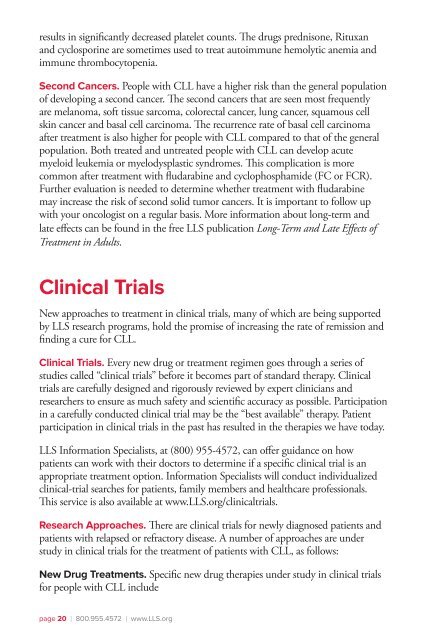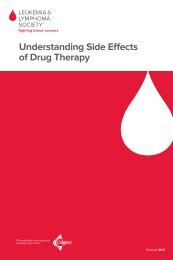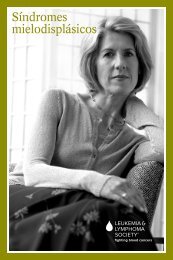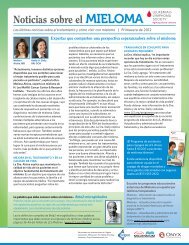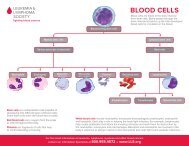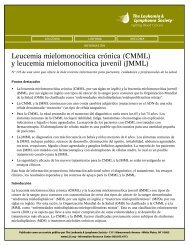Chronic Lymphocytic Leukemia - The Leukemia & Lymphoma Society
Chronic Lymphocytic Leukemia - The Leukemia & Lymphoma Society
Chronic Lymphocytic Leukemia - The Leukemia & Lymphoma Society
Create successful ePaper yourself
Turn your PDF publications into a flip-book with our unique Google optimized e-Paper software.
esults in significantly decreased platelet counts. <strong>The</strong> drugs prednisone, Rituxan<br />
and cyclosporine are sometimes used to treat autoimmune hemolytic anemia and<br />
immune thrombocytopenia.<br />
Second Cancers. People with CLL have a higher risk than the general population<br />
of developing a second cancer. <strong>The</strong> second cancers that are seen most frequently<br />
are melanoma, soft tissue sarcoma, colorectal cancer, lung cancer, squamous cell<br />
skin cancer and basal cell carcinoma. <strong>The</strong> recurrence rate of basal cell carcinoma<br />
after treatment is also higher for people with CLL compared to that of the general<br />
population. Both treated and untreated people with CLL can develop acute<br />
myeloid leukemia or myelodysplastic syndromes. This complication is more<br />
common after treatment with fludarabine and cyclophosphamide (FC or FCR).<br />
Further evaluation is needed to determine whether treatment with fludarabine<br />
may increase the risk of second solid tumor cancers. It is important to follow up<br />
with your oncologist on a regular basis. More information about long-term and<br />
late effects can be found in the free LLS publication Long-Term and Late Effects of<br />
Treatment in Adults.<br />
Clinical Trials<br />
New approaches to treatment in clinical trials, many of which are being supported<br />
by LLS research programs, hold the promise of increasing the rate of remission and<br />
finding a cure for CLL.<br />
Clinical Trials. Every new drug or treatment regimen goes through a series of<br />
studies called “clinical trials” before it becomes part of standard therapy. Clinical<br />
trials are carefully designed and rigorously reviewed by expert clinicians and<br />
researchers to ensure as much safety and scientific accuracy as possible. Participation<br />
in a carefully conducted clinical trial may be the “best available” therapy. Patient<br />
participation in clinical trials in the past has resulted in the therapies we have today.<br />
LLS Information Specialists, at (800) 955-4572, can offer guidance on how<br />
patients can work with their doctors to determine if a specific clinical trial is an<br />
appropriate treatment option. Information Specialists will conduct individualized<br />
clinical-trial searches for patients, family members and healthcare professionals.<br />
This service is also available at www.LLS.org/clinicaltrials.<br />
Research Approaches. <strong>The</strong>re are clinical trials for newly diagnosed patients and<br />
patients with relapsed or refractory disease. A number of approaches are under<br />
study in clinical trials for the treatment of patients with CLL, as follows:<br />
New Drug Treatments. Specific new drug therapies under study in clinical trials<br />
for people with CLL include<br />
page 20 I 800.955.4572 I www.LLS.org


